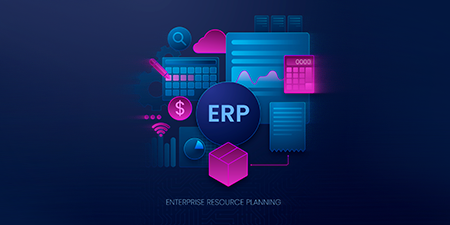ERP (Enterprise Resource Planning) on the cloud refers to the deployment of ERP software applications on cloud computing infrastructure and platforms
. Traditional ERP systems were often deployed on-premises, where companies would host the software on their own servers and manage the infrastructure internally. However, with the advent of cloud computing, ERP vendors began offering cloud-based ERP solutions that provide numerous benefits to organizations. Here's an overview:
-
Cloud Infrastructure: Cloud-based ERP solutions leverage infrastructure provided by cloud service providers such as Amazon Web Services (AWS), Microsoft Azure, or Google Cloud Platform. These cloud infrastructures offer scalability, reliability, and flexibility, allowing organizations to scale their ERP systems up or down based on demand without having to invest in physical hardware.
-
Subscription Model: Cloud-based ERP solutions typically operate on a subscription-based pricing model, where companies pay a recurring fee for using the software. This eliminates the need for large upfront investments in software licenses and infrastructure, making ERP more accessible to organizations of all sizes, including small and medium-sized enterprises (SMEs).
-
Accessibility: Cloud-based ERP systems can be accessed from anywhere with an internet connection, allowing users to work remotely or access critical business data while on the go. This accessibility improves collaboration among employees, facilitates real-time decision-making, and enhances overall productivity.
-
Scalability: Cloud-based ERP solutions offer scalability, allowing organizations to easily add or remove users, modules, or features as their business needs evolve. Cloud infrastructure can quickly adapt to changes in workload and resource requirements, ensuring that ERP systems can accommodate growth without disruption.
-
Automatic Updates and Maintenance: Cloud-based ERP vendors handle software updates, patches, and maintenance tasks, reducing the burden on internal IT teams. This ensures that organizations always have access to the latest features, security enhancements, and performance improvements without needing to manage upgrades manually.
-
Data Security and Compliance: Cloud-based ERP providers implement robust security measures and compliance standards to protect sensitive business data stored in the cloud. They employ encryption, access controls, data backups, and disaster recovery mechanisms to ensure data integrity, confidentiality, and availability.
-
Integration Capabilities: Cloud-based ERP systems offer seamless integration with other cloud services, third-party applications, and business systems through APIs (Application Programming Interfaces) and integration platforms. This enables organizations to streamline business processes, automate workflows, and consolidate data across multiple systems.
-
Analytics and Business Intelligence: Cloud-based ERP solutions often include built-in analytics and business intelligence tools that provide insights into key performance indicators (KPIs), trends, and patterns within the organization. These tools enable data-driven decision-making and empower users to identify opportunities for improvement and optimization.
Overall, ERP on the cloud offers numerous advantages over traditional on-premises ERP deployments, including cost savings, scalability, accessibility, and enhanced functionality. As a result, many organizations are increasingly adopting cloud-based ERP solutions to streamline operations, drive innovation, and gain a competitive edge in today's digital economy.



